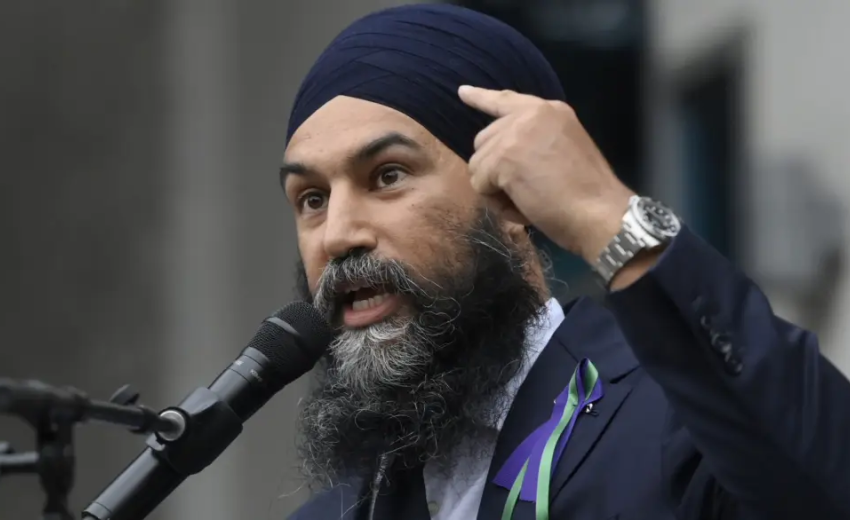Singh's wardrobe features impeccably tailored bespoke suits, which he views as a form of “social armour”.
Jagmeet Singh, a prominent Canadian politician, is known for his distinctive style and commitment to social justice. As a Sikh man with a long black beard and turban, Singh consciously uses his fashion choices to challenge stereotypes and create positive engagement.
Singh's wardrobe features impeccably tailored bespoke suits, which he views as a form of "social armour”. Recognizing that his appearance naturally draws attention, he leverages his stylish attire to counter potential negative perceptions. His turban, which he sometimes wears in black but often chooses in vibrant colours like pink or turquoise, serves as a reflection of his mood and a conversation starter.
A graduate of Osgoode Hall Law School and former criminal lawyer, Singh entered politics as the Member of Provincial Parliament (MPP) for Bramalea-Gore-Malton in 2011. At 36, he became one of the youngest politicians at Queen's Park and the first turban-wearing Sikh in the Ontario legislature's history. Singh quickly rose to prominence within the New Democratic Party (NDP), becoming its deputy leader and gaining recognition as a rising political star.
Despite his professional achievements and academic success, Singh has faced discrimination throughout his life. Since his teenage years in Windsor, Ontario, he has been subjected to unwarranted police stops. These incidents have persisted even after his election to public office. Motivated by his personal experiences and commitment to human rights, Singh is now taking action to address systemic discrimination in policing. He plans to develop a framework for legislation to ban the controversial practice of carding. This police tactic, which involves stopping and questioning individuals not suspected of a crime to gather personal information, has been criticized for disproportionately targeting minorities.
To create this legislative framework, Singh intends to spend the summer consulting with various groups and individuals. He aims to introduce his plan in the fall, joining a growing chorus of influential voices calling for a ban on carding. This initiative aligns with Singh's motivations for entering politics, which centred on fighting for human rights. The debate surrounding carding is particularly intense in Toronto, where critics argue that the practice unfairly impacts minority communities. Singh's efforts to address this issue reflect his commitment to social justice and his desire to use his position to effect meaningful change in Canadian society.
“My goal is to push the government on this issue,” he says. “This isn’t just a Toronto issue … this is something that impacts kids and youth across the province in any urban setting.”
Family background
Jagmeet Singh's journey from privileged upbringing to political advocate is a story of resilience and determination. Born in Canada to Punjabi immigrant parents, Singh spent his early years in St. John's before moving to Windsor. His father, a psychiatrist, and his mother, a teacher, provided a comfortable life for their family.
Despite his privileged background, Singh faced discrimination from an early age. His distinctive appearance—wearing a turban since age six, never cutting his waist-length hair, and sporting a full beard—made him stand out. This visibility led to frequent "routine stops" by police when he drove his father's Mercedes with friends, a pattern he quickly recognized as racial profiling.
In Windsor, Singh learned to physically defend himself against bullies. However, he found this approach unsatisfying and instead chose to excel in academics, his career, and life as a more constructive response to adversity. Singh's experiences have given him a nuanced perspective on societal acceptance. While he appreciates positive recognition, such as being named one of Toronto's best-dressed individuals, he remains acutely aware of the persistent discrimination he faces. He recounts a recent incident of being stopped by police while cycling in downtown Toronto, evoking the same feelings of exclusion he experienced as a child in Windsor.
These encounters with discrimination have shaped Singh's political ideology and career. Encouraged by his parents to give back to society, he found inspiration in former federal NDP leader Jack Layton's support for minority communities. Singh's own outspokenness, particularly regarding violence against women and minority rights in India, has had consequences. He claims to have been denied a visa to India—an unprecedented occurrence for a Canadian elected official—when he was to receive a major award.
Singh's commitment to human rights extends to his political stance. He notably abstained from events surrounding Indian Prime Minister Narendra Modi's visit to Canada, stating the importance of maintaining human rights standards in international relations.
As the legislative session concludes for the summer, Singh plans to attend a human rights conference in California. An avid cyclist, he travels with a foldable bicycle, embodying both practicality and style.
Singh's fashion sense is as distinctive as his political views.He can be spotted sporting a checked suit, black turban, and sockless shoes—his "cool summer style." He also wears a small, intricately designed kirpan, crafted by a former hippie turned Sikh in New Mexico. This smaller kirpan, which Singh affectionately calls a "beautiful little guy," is more suitable for travel than his usual larger one. It serves as a symbol of his oath to protect human rights.
Through his experiences and choices, Jagmeet Singh exemplifies the complex interplay between personal identity, societal perceptions, and political activism in contemporary Canada.
*Based on an article by Jane Taber, published in theglobeandmail.com, on 9th June 2015

